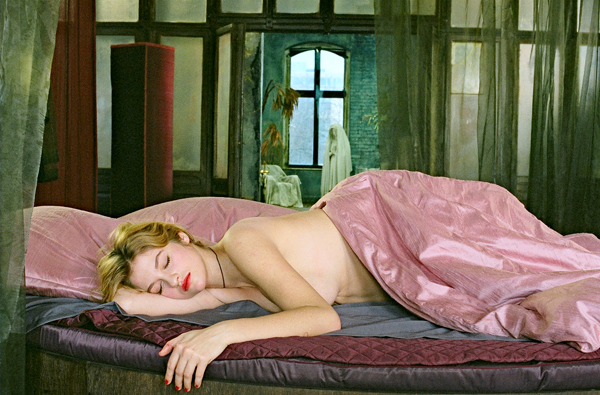|
Reviews of Recent Independent, Foreign, & Documentary Films in Theaters and DVD/Home Video
 HOUSE OF
THE SLEEPING BEAUTIES
In his late sixties, Edmond (director Vadim Glowna) has enjoyed a life of comfort and financial success in upper-middle-class Berlin. From the outset, though, his loneliness is immediately recognizable. His wife has passed away, and his only friend, Kogi (Herr Kogmann—the nickname is a play on the Japanese character in the original 1961 short story), lives in a far more spiritual state of mind than Edmond. Played by Maximilian Schell, Kogi is aloof and mysterious. He lives in a surreal high-rise apartment far above the city, and already seems to know the answers to many of Edmond’s questions, spoken and unspoken. “I stopped thinking of women as women years ago,” he says in response to Edmond’s complaints of loneliness. To help, Kogi sends his dejected friend to a special kind of brothel, one in which patrons may spend the night with sleep-induced young women. They are prostitutes, drugged and unconscious. Edmond is immediately sold and takes strange liberties. He sees them purely as sleeping bodies, but also as representations of all the women from his life, including former lovers and even his own mother (one of the more disturbing acts includes suckling a nipple in search of milk). To be sure, the moral outrage of the audience should be off the charts at this point. Where do the girls come from? Where happens to them afterward? Edmond, too, attempts a tentative search for answers, but is tempered by the vague flirtations and misdirection from the Madame (Angela Winkler), who only further piques his interest. Rather than working to help the women, he finds himself more emotionally obsessed with them. As an exploration of the sexual and emotional needs of old men, this film is comprehensive, but it eventually glosses over the issue of sex slavery. The specifics of the girls are forgotten as the old man’s self-obsession takes center stage. Whatever second thoughts he has are internalized in an attempt to satisfy his own desires. Edmond, as a character, is nothing if not a gross representation of what is wrong with the rich and benighted exploiters of the less fortunate. Nobel Prize-winner Yasunari Kawabata’s stories were set in a Japanese culture that historically had more openly acknowledged sex servitude, a society where perhaps this story would make more sense. In contemporary Germany, there is something anachronistic about a brothel of this kind. The metaphysics of Edmond’s twilight years is Glowna’s obvious focus, yet the weird and surreal setting is far more interesting as a subject. The brothel is a spooky mix of Eastern and Medieval aesthetic, and Kogi’s high-rise features mythical statues as decorations and appears to sit somewhere far in the clouds. Exposing himself
(literally) as a feeble and ineffectual old man, Edmond’s behavior
pathetically emphasizes the horrors of 20th-century exploitation. The
sex service industry, typical of most production today (farming,
textiles, drug manufacturing), placates those who don’t want to know
anything of the sordid details. The prostitutes shall be defenseless and
without personality upon a customer’s arrival, and in the morning, they
shall have no memory of what has been done to them. The actual process
should never be made apparent, especially as long as the money is paid.
The Madame also establishes rules for Edmond. He should never know who
the girls are, and he should always schedule his appointments
meticulously. In the end, it’s quite obvious that the restrictions
insulate him from the evil of which he is a part.
Michael Lee
|

